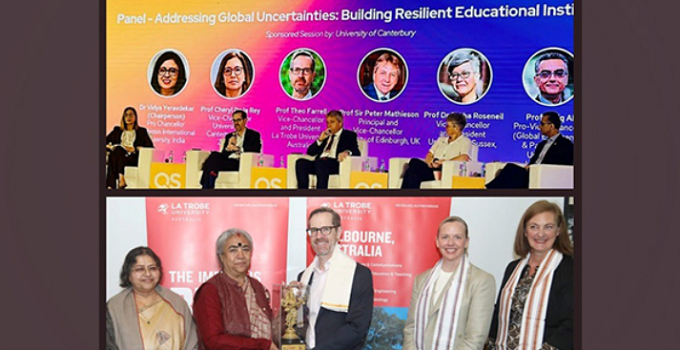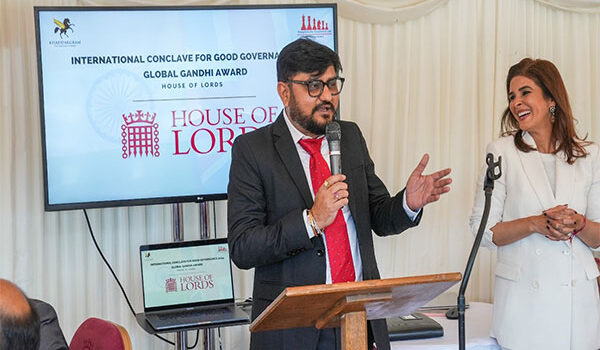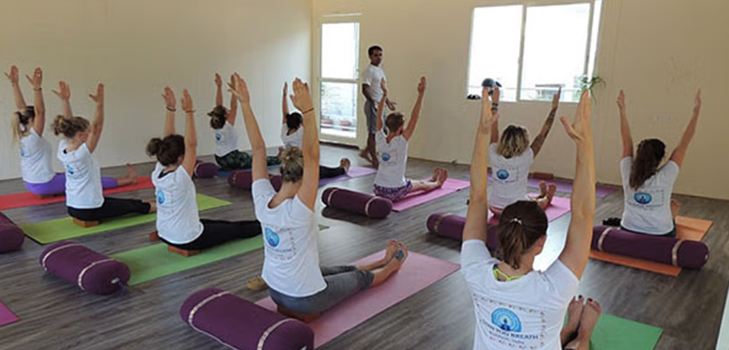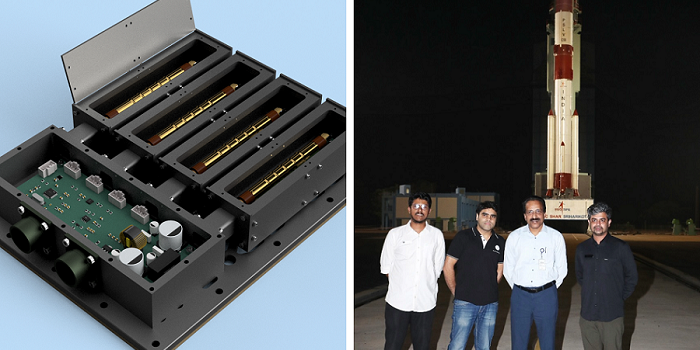- Prof Theo Farrell participates in a Panel Discussion @QS India Summit 2025, Goa
- Celebrates 30th Anniversary of La Trobe’s partnership with Lady Shri Ram College for Women (LSR), Delhi
- Panel participation at The PIE Live event in Delhi discussion Workforce trends, national education policy, and global collaboration in education
- LaTrobe’s partnerships with Indian Institutions viz. BIRAC and Bangalore Bioinnovation Centre for advancing research and innovation
Professor Farrell said that La Trobe has a proud and longstanding history in India, partnering with higher education institutions and key industries on projects of benefit to both countries as well as joint educational initiatives, and that he looked forward to his third visit since starting at the University in February 2024.
“I am delighted to have visited India again and deepened La Trobe’s existing partnerships with esteemed Indian universities and industries, while forging new ones,” Professor Farrell said.
“Our significant expertise in areas including bio-innovation, health and wellbeing, technology and sustainable food and agriculture are being utilised through our partnerships with prestigious institutions in India such as the Biotechnology Industry Research Assistance Council (BIRAC) and the Bangalore Bioinnovation Centre (BBC) with whom we are establishing Bio Innovation corridors to support the development of research and innovation.
“Likewise, I am excited at the prospect of exploring further learning opportunities for students in India and in Australia via joint educational partnerships in India. Together, we can achieve remarkable milestones and contribute to the development of higher education in both countries.”
Professor Farrell participated in a panel discussion at the QS India Summit 2025 in Goa on Tuesday, 28 January, which was chaired by Dr Vidya Yeravdekar, Pro Chancellor of Symbiosis International University. Prof Farrell address the theme “Addressing Global Uncertainties: Building Resilient Educational Institutions”. The summit, hosted by the Ministry of Education, Government of India and SRM Institute of Science and Technology, which provided an important platform for discussing global challenges in higher education.
Australia’s La Trobe University Celebrated 30th Anniversary of Indian Partnership
La Trobe University Vice-Chancellor and President Professor Theo Farrell celebrated the enduring strength of the Australian institution’s 30-year partnership with Lady Shri Ram College for Women (LSR) during a visit in India today (31 January 2025).
Professor Farrell, who was joined on his visit by Victorian Commissioner to South Asia Michelle Wade, met with LSR Principal Professor Suman Sharma at the school’s South Delhi campus to recognise the significant 30th anniversary milestone.
The partnership, one of La Trobe’s longest standing in India, enables the exchange of students between the two institutions, provides LSR staff with professional development opportunities at La Trobe and supports opportunities in research and innovation.
Professor Farrell said La Trobe was proud of its continuing partnership with LSR as it aligned with the University’s goals to build inclusive communities, advance academic excellence and lead transformative change.
“Lady Shri Ram College is one of the most highly respected and successful institutions in India and we value the relationship we have forged over the past 30 years,” Professor Farrell said.
“What began in a modest meeting room at La Trobe University in 1995, has flourished into one of our University’s most enduring and successful international partnerships.
“We look forward to developing and growing our partnership over the coming years as the two institutions continue to support women from diverse backgrounds to become tomorrow’s leaders.”
Professor Suman Sharma, Principal of Lady Shri Ram College for Women, extended a warm welcome to La Trobe’s Vice-Chancellor and President Professor Theo Farrell and Deputy Vice-Chancellor Future Growth, Dr Stacey Farraway, and gave special thanks to Victorian Commissioner Michelle Wade for joining them in celebrating thirty years of partnership with La Trobe University.
“Commitment, integrity and exchange of knowledge besides students’ welfare is the hallmark of our partnership with La Trobe,” Professor Sharma said.
“The long-standing partnership was renewed with fresh vigor in 2023. Among top universities which signed the bilateral Exchange Agreements, LSR was proud to be one of the Colleges which signed the Memorandum of Understanding (MoU) in presence of Hon’ble Minister of Education, Dharmendra Pradhan, Australian Education Minister Honourable Jason Clare, along with a senior delegation from the Education sector.
“La Trobe’s former Vice-Chancellor, Professor John Dewar, and I signed the Agreements marking the partnership between LSR and La Trobe. Today as we celebrate three decades of collaboration and exchange, we extend our commitment in the forthcoming years to education and multiculturalism in a global world.”
About Lady Shri Ram College for Women
Lady Shri Ram College was founded in 1956 by Sir Shri Ram, in memory of his wife.
It has grown from an initial 243 students and nine faculty members to become one of India’s premier institutions for women’s education.
This growth mirrors the evolution of the La Trobe’s partnership, which has facilitated the exchange of 63 students – 31 inbound and 32 outbound participants – making LSR the University’s most sought-after Indian exchange destination.
LSR’s mission is to empower women to assume leadership roles in a globalised, rapidly changing, technology-based nation and world.
Among its distinguished alumni are CFO and Managing Director of the World Bank Group, Anshula Kant; the First Deputy Managing Director of the International Monetary Fund, Gita Gopinath; former Supreme Court of India Judge Indu Malhotra, filmmaker Deepa Mehta and Bollywood actress Aditi Rao Hydari.
Today’s partnership operates within the broader framework of La Trobe’s agreement with Delhi University, reflecting the complex interconnections of international education.
La Trobe University and India
- La Trobe University is ranked in the top 1 per cent of Universities worldwide
- Times Higher Education (THE), 2024, World University Rankings 2025; Consejo Superior de Investigaciones Cientificas (CSIC), 2024, Ranking Web of Universities
- The University has a proud record of educating students from India, with around 11,000 people born in India among our alumni.
- La Trobe University is one of the founding members of the Australia India Institute.
- The IIT Kanpur – La Trobe Research Academy was established in 2020.
- Asian Smart Cities Research Innovation Network (ASCRIN), was founded by La Trobe in 2019 and is now its single largest research internationalisation initiative with joint investment of more than AUD $43 million (Rs 235 crores). It is a partnership designed to improve sustainability, liveability and efficiency of Asian cities. Partners in the network include Tata Institute of Social Science; the Indian Institute of Technology Kanpur (IIT-K) and Birla Institute of Technology and Science, Pilani (BITS-Pilani) which includes more than 250 researchers and over 70 joint-PhD projects.
- In 2024, the University announced that it would be establishing a Bio Innovation Corridor with India’s Biotechnology Industry Research Assistance Council (BIRAC) and the Bangalore Bioinnovation Centre (BBC), to support the development of research and innovation.
- Dignitaries La Trobe University has hosted from the Indian subcontinent include Prime Minister Mrs Indira Gandhi, Kapil Dev, Malaika Arora Khan, Amitabh Bachchan, Rajkumar Hirani, Abhijat Joshi and, most recently, actor, producer and women’s equality advocate, Shah Rukh Khan.
- La Trobe offers the Shah Rukh Khan La Trobe University PhD Scholarship, providing a life-changing opportunity for an aspiring female researcher from India to make a meaningful impact in the world.
- La Trobe University is one of only two universities in Australia teaching Hindi, and the only Australian University to teach a subject on the history, music, and storytelling of popular Hindi cinema.
- The La Trobe Library collection houses more than 38,000 volumes of monographs, journals, magazines and government publications from India, one of the largest collections in Australia.
- La Trobe has been a proud sponsor of the Indian Film Festival in Melbourne since it began in 2010.
Media enquiries
BUZZ Communications [India] Achal Paul – achal@buzzcomm.in Mob: +91 98101 62377
La Trobe University [Australia] media team:
media@latrobe.edu.au | https://www.latrobe.edu.au/news/contact-us












